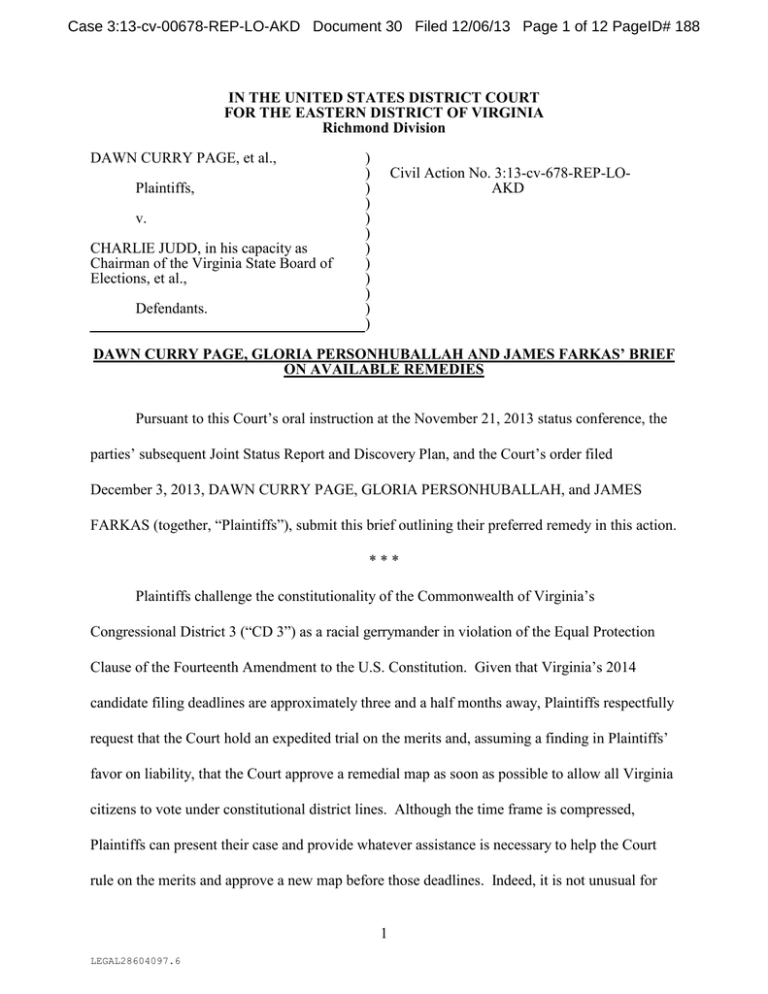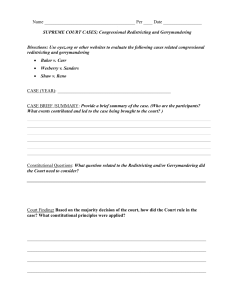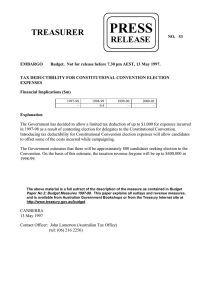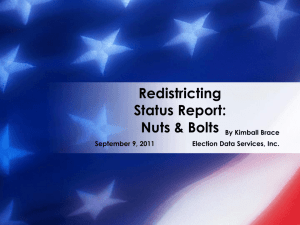Case 3:13-cv-00678-REP-LO-AKD Document 30 Filed 12/06/13 ... DAWN CURRY PAGE, et al., IN THE UNITED STATES DISTRICT COURT
advertisement

Case 3:13-cv-00678-REP-LO-AKD Document 30 Filed 12/06/13 Page 1 of 12 PageID# 188 IN THE UNITED STATES DISTRICT COURT FOR THE EASTERN DISTRICT OF VIRGINIA Richmond Division DAWN CURRY PAGE, et al., Plaintiffs, v. CHARLIE JUDD, in his capacity as Chairman of the Virginia State Board of Elections, et al., Defendants. ) ) ) ) ) ) ) ) ) ) ) ) Civil Action No. 3:13-cv-678-REP-LOAKD DAWN CURRY PAGE, GLORIA PERSONHUBALLAH AND JAMES FARKAS’ BRIEF ON AVAILABLE REMEDIES Pursuant to this Court’s oral instruction at the November 21, 2013 status conference, the parties’ subsequent Joint Status Report and Discovery Plan, and the Court’s order filed December 3, 2013, DAWN CURRY PAGE, GLORIA PERSONHUBALLAH, and JAMES FARKAS (together, “Plaintiffs”), submit this brief outlining their preferred remedy in this action. *** Plaintiffs challenge the constitutionality of the Commonwealth of Virginia’s Congressional District 3 (“CD 3”) as a racial gerrymander in violation of the Equal Protection Clause of the Fourteenth Amendment to the U.S. Constitution. Given that Virginia’s 2014 candidate filing deadlines are approximately three and a half months away, Plaintiffs respectfully request that the Court hold an expedited trial on the merits and, assuming a finding in Plaintiffs’ favor on liability, that the Court approve a remedial map as soon as possible to allow all Virginia citizens to vote under constitutional district lines. Although the time frame is compressed, Plaintiffs can present their case and provide whatever assistance is necessary to help the Court rule on the merits and approve a new map before those deadlines. Indeed, it is not unusual for 1 LEGAL28604097.6 Case 3:13-cv-00678-REP-LO-AKD Document 30 Filed 12/06/13 Page 2 of 12 PageID# 189 courts considering redistricting challenges to adjudicate liability and adopt new maps on highly expedited schedules, in some cases completing both in a matter of weeks. In the alternative, if it becomes necessary, the Court may order the Commonwealth to revise its filing deadlines. Although doing so would admittedly involve administrative burdens, they are outweighed by the right of Virginians to elect their congressional representatives under a constitutional map. In either case, it is imperative that the Court not allow another election to take place based on unconstitutional district lines. I. BACKGROUND Plaintiffs brought this action to ensure that their Fourteenth Amendment right, recognized by the Supreme Court in Shaw v. Reno, 509 U.S. 630, 639 (1993), to elect their representatives in districts free from unconstitutional racial gerrymandering, is not violated in 2014 or any subsequent congressional election cycle. Plaintiffs specifically challenge the bizarrely-shaped CD 3 in the wake of the Supreme Court’s recent ruling in Shelby County v. Holder, 570 U.S. ___, 133 S. Ct. 2612 (2013), holding that Virginia is no longer deemed a covered jurisdiction for purposes of Section 5 of the Voting Rights Act. Accordingly, any purported Section 5 justification for Virginia’s race-based redistricting of CD 3 has been eviscerated. Plaintiffs seek declaratory and injunctive relief, including a permanent injunction prohibiting Defendants from conducting any elections for the U.S. House of Representatives based on the current CD 3 and taking any action necessary to determine and order a valid plan. Compl. 10 (ECF No. 1). Candidates wishing to represent CD 3 following the next Congressional election cycle must announce that intention by filing with the State Board of Elections between March 10 and March 27, 2014. Va. Code §§ 24.2-515, 24.2-522. Accordingly, expedited review is necessary to ensure that Virginians will not be compelled to vote under an illegal map in 2014. At the 2 LEGAL28604097.6 Case 3:13-cv-00678-REP-LO-AKD Document 30 Filed 12/06/13 Page 3 of 12 PageID# 190 November 21st status conference, the Court set expedited deadlines for expert disclosures and directed the parties to brief the Plaintiffs’ proposed remedy, assuming a finding in their favor on liability. See Joint Status Report & Discovery Plan 2 (ECF No. 15); Dec. 3, 2013 Order (ECF No. 27). This brief, which outlines the remedial options available to the Court, is submitted in response to that order. II. A. ARGUMENT If the Court Determines That CD 3 Was a Racial Gerrymander, It Will Be the Court’s Duty To Ensure That a Constitutional Map Is Approved In Its Place Courts have and regularly exercise the “power . . . [either] to require valid reapportionment or to formulate a valid redistricting plan.” Scott v. Germano, 381 U.S. 407, 409 (1965) (emphasis added). If time allows, a court should give the appropriate legislative body an opportunity to enact a new plan that avoids the constitutional infirmities in the invalidated plan. See McDaniel v. Mehfoud, 702 F. Supp. 588, 596 (E.D. Va. 1988); Nathaniel Persily, When Judges Carve Democracies: A Primer on Court-Drawn Redistricting Plans, 73 Geo. Wash. L. Rev. 1131, 1133 (2005). But, as the Supreme Court has explained, “[a]lthough the legislative branch plays the primary role in congressional redistricting, our precedents recognize an important role for the courts when a districting plan violates the Constitution.” League of United Latin Am. Citizens v. Perry, 548 U.S. 399, 415 (2006). In particular, where it is clear that the appropriate legislative body will not or cannot enact a valid plan in time, as when the “imminence of . . . [an] election makes [referral to the legislative branch] impractical . . . it becomes the ‘unwelcome obligation’ of the federal court to devise and impose a reapportionment plan pending later legislative action.” Wise v. Lipscomb, 437 U.S. 535, 540 (1978) (principal opinion) (internal citation omitted). 3 LEGAL28604097.6 Case 3:13-cv-00678-REP-LO-AKD Document 30 Filed 12/06/13 Page 4 of 12 PageID# 191 Here, given that the Court has indicated it may schedule an expedited trial in early February, along with the fact that state law sets the candidate filing deadlines for mid-March, there may not be sufficient time to refer this matter to the General Assembly for preparation of a constitutional plan while still maintaining those deadlines. See, e.g., In re Legislative Redistricting of State, 805 A.2d 292, 298 (Md. 2002) (finding legislative redistricting plan adopted by the state legislature violated state constitution and developing and adopting court plan because “legislative elections are imminent, [and] there is simply no time to return the matter to the political branches”). Any plan devised by the General Assembly must work its way through the normal legislative process, including referral to a committee of each house, a majority vote in both chambers, and approval by the Governor. Va. Const. art. IV, § 11; id. art. V, § 6. A remedial plan developed by the Court, by contrast, is free to proceed efficiently and expeditiously to remedy the constitutional violation before the candidate filing deadline. Accordingly, Plaintiffs anticipate that the Court may ultimately bear the responsibility of approving a remedial plan for use in the 2014 congressional election cycle.1 If, however, the Court rules in sufficient time before the mid-March filing deadlines, the General Assembly and Governor would be free to develop and adopt a new plan in time for the 2014 election. Thus, in Moon v. Meadows, 952 F. Supp. 1141 (E.D. Va. 1997), when a threejudge panel of this Court found that the evidence was “overwhelming” that CD 3 as then configured was an unconstitutional racial gerrymander, but the next congressional election was 1 On at least two occasions, courts in this district have crafted remedial maps. See Neal v. Coleburn, 689 F. Supp. 1426, 1427, 1438-39 (E.D. Va. 1988) (adopting plaintiffs’ proposed remedial plan and ordering special election to remedy Nottoway County districting scheme held to be in violation of Voting Rights Act); Henderson v. Bd. of Supervisors of Richmond Cnty., Va., Civ. A. No. 87-0560-R, 1988 WL 86680, at ** 9-10 (E.D. Va. June 6, 1988) (adopting plaintiffs’ proposed remedial plan and ordering special election to remedy illegal Richmond County election plan). 4 LEGAL28604097.6 Case 3:13-cv-00678-REP-LO-AKD Document 30 Filed 12/06/13 Page 5 of 12 PageID# 192 more than a year away, the Court properly issued an injunction, prohibiting defendants and their agents: [F]rom coordinating and/or conducting an election of any person to membership in the United States House of Representatives from the Third Congressional District until such time as the Virginia General Assembly enacts, and the Governor approves, a new redistricting plan for said district which conforms to all requirements of law, including the Constitution of the United States. Id. at 1151. “Constitutional violations, once apparent, should not be permitted to fester; they should be cured at the earliest practicable date.” Desena v. Maine, 793 F. Supp. 2d 456, 462 (D. Me. 2011). The constitutional violation apparent in CD 3 warrants an expedited trial on the merits, with a remedy to be imposed as soon as possible after a finding in Plaintiffs’ favor on liability. While the proper remedy depends on how much time remains before election deadlines, whether it is done by the Court or the General Assembly, a remedial map should be developed to cure the constitutional violation in time for the upcoming candidate filing deadline. B. There Is Sufficient Time For the Court To Rule on the Merits and Approve a Constitutional Map For Use in the 2014 Election Although the candidate filing deadline for the 2014 election is fast approaching, there is sufficient time for the Court to both rule on the merits and develop a constitutional map in advance of the deadline. Cases challenging redistricting plans almost always proceed on a highly expedited basis to ensure that the court can reach a decision on the merits and enter whatever relief is appropriate in time for the next election cycle. Innumerable cases from around the country demonstrate that there is time for this Court to rule on the merits and approve a new map for use in the 2014 election. 5 LEGAL28604097.6 Case 3:13-cv-00678-REP-LO-AKD Document 30 Filed 12/06/13 Page 6 of 12 PageID# 193 If this Court finds in Plaintiffs’ favor at the culmination of an expedited trial on the merits, there will be sufficient time for it to implement a remedy, including to draw and adopt a remedial plan. This Court would have the option to choose from several approaches in formulating a plan of its own. For instance, it could adopt a plan proposed by a party to the litigation in whole or in part, prepare an entirely new plan of its own making, and/or enlist the help of a special master or technical expert in evaluating, adopting, or drawing a remedial plan. See, e.g., Adamson v. Clayton Cnty. Elections and Registration Bd., 876 F. Supp. 2d 1347, 135253 (N. D. Ga. 2012) (utilizing independent technical advisor to aid in creating new map in time for looming qualifying deadlines and election); Larios v. Cox, 314 F. Supp. 2d 1357, 1359, 136364 (N.D. Ga. 2004), summarily aff’d, 542 U.S. 947 (2004) (finding plan invalid on February 10, 2004, appointing special master on March 1, and approving special master’s plan on March 25); Navajo Nation v. Ariz. Indep. Redistricting Comm’n, 230 F. Supp. 2d 998, 1003-05 (D. Ariz. 2002) (using academic redistricting expert as special master to assist in evaluating proposed remedial plan submitted to three-judge panel for use in upcoming election mere weeks before statutory qualifying deadline); Hastert v. State Bd. of Elections, 777 F. Supp. 634, 661-62 (N.D. Ill. 1991) (comparing and ultimately adopting one of competing congressional redistricting plans submitted by plaintiffs where legislature failed to enact new districting scheme following census); Stephenson v. Bartlett, 582 S.E.2d 247, 248-49 (N.C. 2003) (finding legislature’s remedial plan unconstitutional and adopting court’s own plan over the course of 11 days); In re Apportionment of State Legislature-1992, 486 N.W.2d 639, 645 n.31 (Mich. 1992) (appointing a panel of current and retired state court judges to prepare an apportionment plan if the Legislature and Governor failed to enact one within five weeks); In re Constitutionality of S. J. Res. 2G, Spec. Apportionment Sess. 1992, 601 So.2d 543, 544-45 (Fla. 1992) (adopting remedial map 6 LEGAL28604097.6 Case 3:13-cv-00678-REP-LO-AKD Document 30 Filed 12/06/13 Page 7 of 12 PageID# 194 curing constitutional infirmities with legislative apportionment plan a mere nine days after Department of Justice denied the map pre-clearance). Recently, a three-judge panel in the Eastern District of New York referred the task of creating a new congressional redistricting plan for the state to a U.S. Magistrate Judge with instructions to complete the work “in the shortest possible time,” as the congressional petitioning process for the next election was barely three weeks away. Favors v. Cuomo, Case No. 11-CV5632, Order of Referral to Magistrate Judge 2, 5 (ECF No. 133) (E.D.N.Y. Feb. 28, 2012). The Magistrate Judge used as a technical consultant a well-respected academic with extensive redistricting expertise to help evaluate proposed plans submitted by interested parties and prepare a draft redistricting plan, which was distributed to the parties for comments and objections on March 5, 2012, just five days after the matter was referred. Case No. 11-CV-5632 (ECF Nos. 178, 184). After receiving and reviewing numerous comments from the parties, the Magistrate Judge recommended that the three-judge panel adopt its recommended plan in a Report and Recommendation issued on March 12. Case No. 11-CV-5632 (ECF No. 178, 223). The panel held a hearing on the parties’ objections and comments to the recommended plan on March 15 and adopted the plan, with some changes, on March 19 -- one day before the congressional election petition process was scheduled to begin. Case No. 11-CV-5632 (ECF Nos. 238, 242). With the help of a special master, the Connecticut State Supreme Court followed a similarly expedited schedule to reapportion its congressional districts over the course of a matter of weeks in January 2012. See Exhibit A (Conn. Sup. Ct. Order Directing Special Master). As these cases demonstrate, the current schedule provides the Court enough time to evaluate the legality of CD 3 and, if need be, approve a new plan before the Commonwealth’s filing deadlines. Indeed, “[g]iven the current state of technology, experts can draw a redistricting 7 LEGAL28604097.6 Case 3:13-cv-00678-REP-LO-AKD Document 30 Filed 12/06/13 Page 8 of 12 PageID# 195 plan for any statewide plan (either legislative or congressional) in about a week.” Persily, When Judges Carve Democracies, 73 Geo. Wash. L. Rev. at 1147. Of course, it also takes time to appoint a special master or otherwise engage experts, but Plaintiffs stand ready to furnish names of redistricting experts who have previously served as special masters and could rapidly prepare a remedial plan for the Court’s adoption. Numerous courts around the country have demonstrated that it is possible to adopt a remedial plan within weeks of finding an existing plan invalid, and there is no reason why this Court could not do the same. C. In the Alternative, the Court May Extend the Filing Deadlines to Allow It Time to Approve a Constitutional Map As set forth above, Plaintiffs believe that the Court can and should develop and implement a remedial plan before the mid-March 2014 candidate filing deadline. Should it become necessary, however, it is well within the Court’s authority to adjust the candidate filing deadlines to enable it to adopt a map free from unconstitutional racial gerrymander for use in the 2014 election cycle. See, e.g., Sixty-Seventh Minn. State S. v. Beens, 406 U.S. 187, 201 n.11 (1972) (“If time presses too seriously, the District Court has the power appropriately to extend the time limitations imposed by state law.”); Larios v. Cox, 305 F. Supp. 2d 1335, 1342-43 (N.D. Ga. 2004) (noting that the “court has broad equitable power to delay certain aspects of the electoral process if necessary” and finding “no reason why the court could not extend [the candidate qualifying] period if this proves to be necessary to ensure constitutional elections”). In fact, recently a three-judge panel in Texas ordered adjustments to the election schedule and other provisions in the Texas Election Code for the 2012 congressional elections in light of outstanding redistricting issues still under review. See Perez v. Perry, Case No. 5:11-CV-00360OLG-JES-XR, Order (ECF No. 685) (W.D. Tex. Mar. 1, 2012). That courts inherently possess 8 LEGAL28604097.6 Case 3:13-cv-00678-REP-LO-AKD Document 30 Filed 12/06/13 Page 9 of 12 PageID# 196 the authority to modify election deadlines when necessary to ensure that an election takes place under a constitutional plan follows from their power to review apportionment plans for constitutional compliance. Indeed, if courts lacked the power to adjust deadlines to remedy constitutional violations in redistricting plans, a state legislature could always evade court review of an unconstitutional map for at least one election cycle -- if not more -- simply by adjusting election-related deadlines. That cannot possibly be the case. Of course, modifying the candidate qualifying deadlines would present an added administrative cost. Under the schedule proposed by Plaintiffs, there would be no need to adjust any dates, as the Court would have sufficient time to determine the merits and implement a remedial map before the mid-March filing period. However, moving various deadlines is within the Court’s power and a far better alternative to allowing the 2014 election take place based on unconstitutional electoral districts. D. Plaintiffs Will Incur Irreparable Harm if the 2014 Elections Are Conducted Under the Current Map Under any of the scenarios outlined above, the Court can and should approve a remedial map for use in the 2014 congressional election. The consequences of allowing another election to take place based on unconstitutional district lines are both extreme and entirely avoidable. If the Court does not approve a new map for use in the 2014 election, but still ultimately concludes that the map is constitutionally invalid, the Court will be forced to choose between permitting representatives elected under the illegal CD 3 and any affected surrounding districts to serve out their terms in seats judged unconstitutional or requiring a special election at great cost to the people of Virginia. These outcomes would inflict either irreparable injury or unnecessary expense, to the detriment of Plaintiffs, Defendants, and Virginia citizens alike. 9 LEGAL28604097.6 Case 3:13-cv-00678-REP-LO-AKD Document 30 Filed 12/06/13 Page 10 of 12 PageID# 197 Generally, courts in this district have recognized the importance of ordering special elections to remedy the irreparable harm suffered by voters when forced to elect their representatives under an unconstitutional voting plans. See, e.g., Neal, 689 F. Supp. at 1439 (ordering special election “to provide full relief as promptly as possible” and “so that Nottoway County blacks can immediately have the opportunity to exercise their votes under a remedial, nondilutive plan”); Henderson, 1998 WL 86680, at *10 (ordering a special election be held for majority black district in adopted remedial election plan). See also League of United Latin Am. Citizens v. Perry, 457 F. Supp. 2d 716, 721 (E.D. Tex. 2006) (ordering special election in five redrawn congressional districts after the Supreme Court found them to be invalid); Wright v. City of Albany, 306 F. Supp. 2d 1228, 1239-40 (M.D. Ga. 2003) (ordering special election because where the “voting public has been prevented from electing its leaders pursuant to a plan which meets constitutional requirements” the “citizens should not be further unduly delayed, even if inconvenient to voting officials”). Ordering a special election, however, imposes severe administrative burdens and costs on the government and citizens of Virginia. The alternative is even more damaging. If the Court were to permit the representatives elected under unconstitutional district lines to serve out their terms, it would send a message to Virginia’s voters that their constitutional rights will only be enforced at the Commonwealth’s convenience, even when those rights are violated by the latter’s own actions. Either course would substantially harm the people of Virginia. The only way to avoid this harm is for the Court to remedy the constitutional violation as expeditiously and efficiently as possible, so that this case may be resolved long before voters go to the polls in June and November. 10 LEGAL28604097.6 Case 3:13-cv-00678-REP-LO-AKD Document 30 Filed 12/06/13 Page 11 of 12 PageID# 198 III. CONCLUSION For the reasons stated above, Plaintiffs respectfully submit that the Court has the authority, responsibility and ability to resolve this litigation on the merits and approve an appropriate remedial map -- either of its own creation or devised by the General Assembly -- in advance of the currently scheduled candidate filing deadlines. However, if it becomes necessary, the Court can and should enter an order modifying those and any related election deadlines to ensure that the 2014 congressional election takes place under a constitutional apportionment scheme, free of racial gerrymandering. Dated: December 6, 2013 Respectfully submitted, By /s/ John K. Roche____________________ John K. Roche (VSB# 68594) Marc Erik Elias (admitted pro hac vice) John Devaney (admitted pro hac vice) Perkins Coie, LLP 700 13th St. N.W., Suite 600 Washington, D.C. 20005-3960 Phone: (202) 434-1627 Fax: (202) 654-9106 Email: JRoche@perkinscoie.com Email: MElias@perkinscoie.com Email: JDevaney@perkinscoie.com Kevin J. Hamilton (admitted pro hac vice) Perkins Coie, LLP 1201 Third Avenue, Ste. 4800 Seattle, WA 98101-3099 Phone: (206) 359-8000 Fax: (206) 359-9000 Email: KHamilton@perkinscoie.com Attorneys for Plaintiffs 11 LEGAL28604097.6 Case 3:13-cv-00678-REP-LO-AKD Document 30 Filed 12/06/13 Page 12 of 12 PageID# 199 CERTIFICATE OF SERVICE I hereby certify that on this 6th day of December, 2013, I will electronically file the foregoing with the Clerk of Court using the CM/ECF system, which will then send a notification of such filing (NEF) to the following: Mike Melis Office of the Attorney General 900 East Main Street Richmond, Virginia 23219 (804) 786-2071 Fax: (804) 786-1991 mmelis@oag.state.va.us Jonathan Andrew Berry Jones Day 51 Louisiana Ave NW Washington, DC 20001 202-879-3939 Fax: 202-626-1700 jberry@jonesday.com Attorneys for Defendants Charlie Judd, Kimberly Bowers, and Don Palmer in their official capacities John Matthew Gore Jones Day 51 Louisiana Ave NW Washington, DC 20001 (202) 879-3930 Fax: (202) 626-1700 jmgore@jonesday.com Michael Anthony Carvin Jones Day 51 Louisiana Ave NW Washington, DC 20001 (202) 879-3939 macarvin@jonesday.com Attorneys for Intervenor-Defendant Virginia Representatives Respectfully submitted, By /s/ John K. Roche (VA Bar No. 68594) Perkins Coie, LLP 700 13th St., N.W., Suite 600 Washington, D.C. 20005-3960 Phone: (202) 434-1627 Fax: (202) 654-9106 JRoche@perkinscoie.com Attorneys for Plaintiffs 12 LEGAL28604097.6



